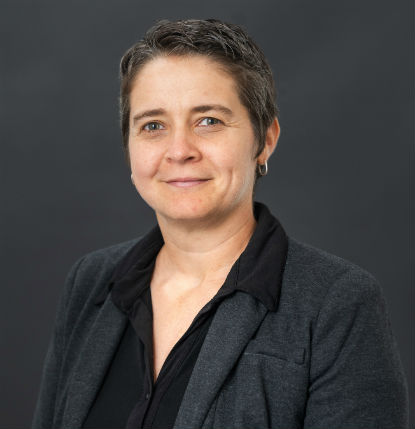I was born in the city of Aguascalientes in central Mexico. I went to college at the Universidad Autónoma de Aguascalientes, where I obtained my B.Sc. in Biology and Chemistry. Then my dream of becoming a scientist brought me to the United States. First to the University of Minnesota where I obtained my Ph.D. in Molecular, Cellular, Developmental Biology and Genetics. During this time, I became fascinated by cells and how they work at the level of genes and molecules. After obtaining my Ph.D., I spent a few years as a postdoctoral researcher at UT-Southwestern Medical Center and then as Research Assistant Professor at The University of Texas at El Paso, before joining Gonzaga University in 2019. Being a faculty member at Gonzaga University allows me to pursue my two passions: understanding how cells work and teaching students about the wonderful world of cells and molecules. When I am not studying cells under the microscope you might find me hiking with our dogs, taking photographs around the city, or cooking some crazy new recipe I just made up.
For a complete list of publications visit
Diaz-Martinez Bibliography
Sample publications:
1.
Díaz-Martínez LA, Karamysheva ZN, Warrington R, Li B, Wei S, Xie XJ, Roth MG, Yu H. Genome-wide siRNA screen reveals coupling between mitotic apoptosis and adaptation. EMBO J. 2014 Jul 14. pii: e201487826. PMID: 25024437
2.
Solomon DA, Kim T, Diaz-Martinez LA, Fair J, Elkahloun AG, Harris BT, Toretsky JA, Rosenberg SA, Shukla N, Ladanyi M, Samuels Y, James CD, Yu H, Kim JS, Waldman T. Mutational inactivation of STAG2 causes aneuploidy in human cancer. Science. 2011 Aug 19; 333(6045):1039-43. doi: 10.1126/science.1203619. PMID: 21852505
3.
Díaz-Martínez LA, Beauchene NA, Furniss K, Esponda P, Giménez-Abián JF, Clarke DJ. Cohesin is needed for bipolar mitosis in human cells. Cell Cycle. 2010 May; 9(9):1764-73. PMID: 20436271
4.
Diaz-Martinez LA, Hernandez AA, D’Arcy CE, Corral S, Bhatt JM, Esparza D, Rosenberg M, Olimpo JT. Current Approaches for Integrating Ethics and Responsible Conduct of Research (E/RCR) Education into Course-based Undergraduate Research Experiences: A National Assessment. CBE-Life Sci Educ. 2021 Sep; 20(3):ar38. PMID: 34241537
I am a cell biologist and I am fascinated by the complexity and beauty of cells. I love studying cells under the microscope but we also use other molecular biology techniques to understand how human cells work at the cellular & molecular level. Currently, my research is focused on two main projects:
a. Discovery of gene function. The function of many human genes remains unknown. Recent studies have shown that there are hundreds of genes required for cell survival that have not been studied. Our research focuses on studying genes with unknown function and testing them for potential roles in cellular processes that are important for cell survival (e.g., cell division, DNA replication and repair, mitochondria function).
b. Chalcones as potential anti-cancer drugs. In partnership with faculty in the Chemistry and Biochemistry Department, students in my Advanced Cell Biology course test novel chalcones for potential functions as anti-proliferative agents in human cancer cell lines.

